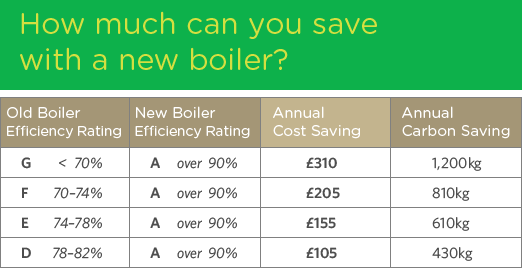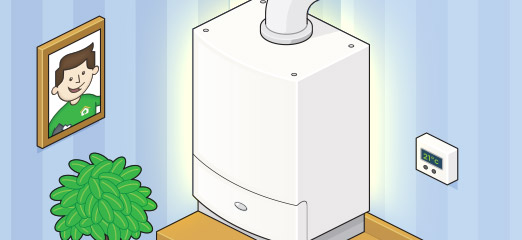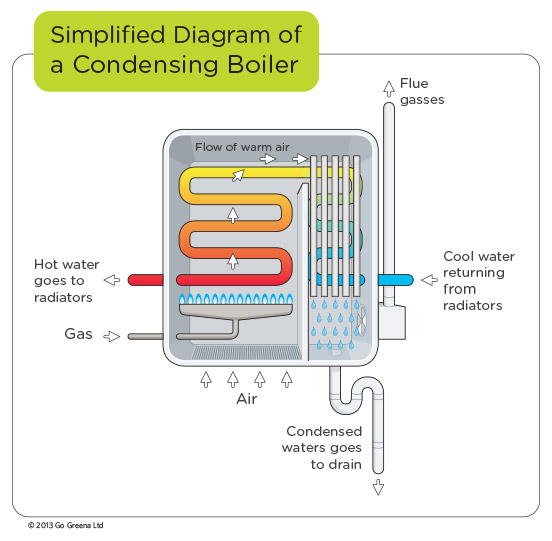As of 1st April 2005, any newly fitted gas-fired boiler in England or Wales must be a condensing boiler. Condensing boilers are modern and highly energy efficient. This article explains how they work and why they are so efficient, as well as how to go about getting funding to get your old boiler replaced.
How does a condensing boiler work?
A standard gas-fired boiler works by burning natural gas in order to heat up your water. When you burn natural gas, the chemical reaction that takes place produces water vapour and carbon dioxide as by-products. These warm waste gases will travel through a flue and escape into the outside atmosphere, taking some valuable heat with them. Conventional boilers vary in efficiency from around 70–80%, depending on their age and the type of boiler. This means that 20–30% of the energy they use is lost in the form of warm gas.
Condensing boilers are able to recover some of the heat that would usually be lost from the waste gases they give off. The waste gases travel through a heat exchanger, which cools and condenses them back into a liquid known as condensate. By doing this, it can recover some of the heat that would have otherwise been lost. The recovered heat is used to slightly warm up the cool water that returns from your radiators as it enters the boiler. A good condensing boiler can achieve energy efficiency of over 90%.
The diagram below is a simplified version of what happens inside a condensing boiler (click the image for a larger view).
Pros and cons of condensing boilers
If you are thinking about upgrading to a condensing boiler, the main thing to consider is the cost. This will depend on a number of factors, but the Energy Saving Trust indicates that a straightforward gas boiler replacement typically costs around £2,300. But before you get your wallet out, check if you can get it done for free (more information about free boilers further down).
Condensing boilers require an extra pipe to drain away the condensate liquid. Ideally this pipe should connect to an internal drain. If this isn’t possible it can be drained externally. A small number of people with external condensate pipes have reported that they can freeze up in very cold weather — this can be prevented with pipe lagging. The condensate is also slightly acidic, so the pipe should be made of an appropriate material in order to prevent corrosion.
Other than the minor points mentioned above, condensing boilers are much more energy efficient and eco-friendly than their older counterparts.
How much money will I save?
This depends on the age and condition of your current boiler. For example, you won’t save a huge amount of money by upgrading from an 86% efficient to a 90% efficient boiler. You would on the other hand save a significant amount if you upgraded from a 70% to an 90% efficient one.
The table below shows the estimated savings you could achieve by upgrading to an A-rated energy efficient boiler. (The figures are estimates based on installing a new A-rated condensing boiler and full set of heating controls in a gas-heated, semi-detached three bedroom house).
As you can see, if you have an old G-rated boiler (which most boilers fitted in 1998 or earlier are) you could reduce your energy bills by £310 a year.

Source: Energy Saving Trust
Can I get my boiler upgraded for free?
In an effort to reduce the country’s carbon emissions, the UK government have put in place a number of schemes to fund home energy saving measures. At the time of writing, you could be eligible to have your old boiler replaced with a new energy efficient condensing boiler if:
A. You receive certain benefits, such as Child Tax Credits, Job Seeker’s Allowance or Income Support,
and
B. You have an old, G-rated boiler (common before 1998).
If you are unsure what the age and energy efficiency rating of your boiler are, please request a free, no-obligation home energy survey here.
You can read more about free boiler schemes here.
You can view all of our home energy saving products here.



2 Replies to “What Is A Condensing Boiler?”
Comments are closed.